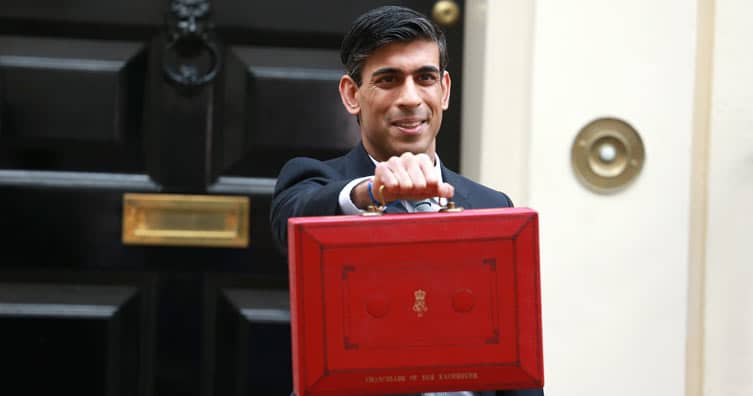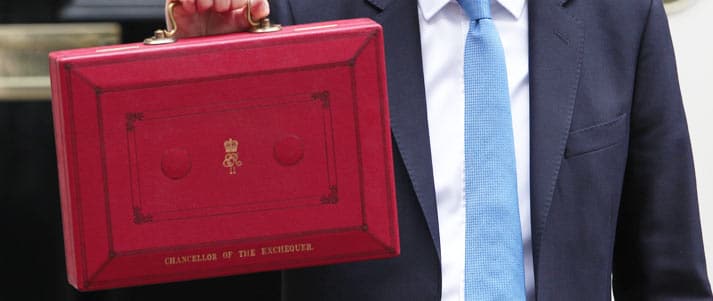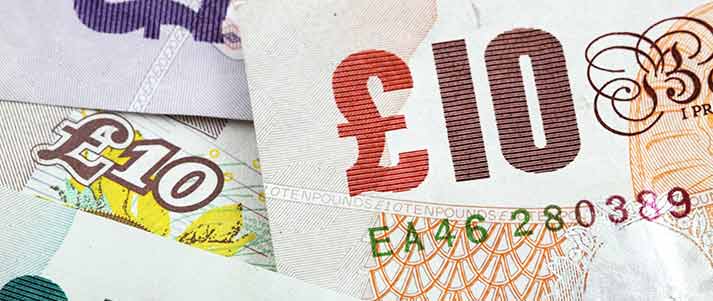Budget 2020 explained for students
The first Budget of Boris Johnson's government has seen announcements on a whole range of issues. Here's what it means for YOU.

Credit: Cubankite – Shutterstock
In amongst all the coronavirus news, you may have missed that today marks a pretty significant day in the UK political calendar: the announcement of the Budget.
COVID-19 actually ended up dominating the Budget as well as the news, with the Chancellor, Rishi Sunak, pledging £30 billion to combat the virus. But it wasn't all crisis management – there were promises on a whole host of things that affect your day-to-day spending.
From the tampon tax to the interest rates on Student Loans, here's how today's Budget affects students.
What is the Budget?

Credit: Twocoms – Shutterstock
The Budget is an annual event which sees the Chancellor provide the nation with an update on the country's finances, as well as announcing the government's plans for taxation and spending in the year ahead.
This Budget should have taken place in November 2019 but there was so much uncertainty over Brexit at the time that it was postponed until 2020.
Since then, the Conservatives have been reelected with a significantly larger majority, we've officially left the EU, and the Chancellor who decided to postpone the Budget, Sajid Javid, has resigned.
Javid's replacement, Rishi Sunak, has only been in the job for a matter of weeks, but the Budget has still gone ahead as planned – and here are the big announcements that affect you.
The 'tampon tax' will soon be abolished

Credit: Anastasiya 99 – Shutterstock
For years, campaigners have called on the government to scrap the VAT on sanitary products. And, for years, the government's response has always been the same: "EU regulations mean that we can't drop the VAT any lower than 5%".
While that sounds like a classic case of the government blaming the EU for an unpopular piece of legislation, it really did seem to be the case.
And, true to their word, now that we've left the European Union, the government has announced that the tampon tax will be completely abolished once the transition period for Brexit ends on 31st December 2020.
Is this good news?
The Chancellor reckons that this will save the average woman about £40 over her lifetime.
Not a huge amount, but cutting the tampon tax has always been about more than just the money – it's been about recognising that sanitary products are a basic necessity for women and should therefore be exempt from VAT, not taxed as 'luxury products'.
The minimum wage is going up

Credit: Paramount Pictures
It's fairly standard for the minimum wage to increase at the start of the new financial year (every April), and this year is no different.
These figures had already been announced, but the Chancellor has today confirmed the following changes to the UK minimum wage, effective as of April 2020:
| Age | Current minimum hourly wage | New minimum hourly wage |
|---|---|---|
| 25+ | £8.21 | £8.72 (+6.2%) |
| 21–24 | £7.70 | £8.20 (+6.5%) |
| 18–20 | £6.15 | £6.45 (+4.9%) |
| Under 18 | £4.35 | £4.55 (+4.6%) |
| Apprentice | £3.90 | £4.15 (+6.4%) |
Is this good news?
Of course! Any changes that help students make more money are welcomed by us – you just need to make sure that your employer is respecting your employment rights and paying you accordingly.
You'll pay less in National Insurance

Although most of you won't earn enough to pay income tax (£12,500 a year, in case you're wondering), you may well be over the threshold for making National Insurance contributions.
Anyone earning over £166 a week (equivalent to £8,632 a year) currently pays National Insurance, which is used to pay for things like the NHS and the state pension.
Before the election, Boris Johnson pledged to raise the National Insurance earnings threshold to £240 a week (£12,500 a year) during this parliament. Assuming there isn't a snap election, this gives the government five years to achieve its goal.
The plan is to gradually raise the threshold each year, and today Rishi Sunak has announced the first increase – as of next month, you'll only make National Insurance contributions if you're earning over £182 a week (£9,500 a year).
Is this good news?
According to the Institute for Fiscal Studies, this change should mean around 500,000 workers stop paying the tax, while those still paying will save about £85 a year – again, not a huge amount, but every penny counts when you're living on a student budget.
No increase in alcohol duties

Credit: Syda Productions – Shutterstock
As you may or may not know, beer, wine, cider and spirits are all subject to taxes by the government.
These taxes (or 'duties', as they're also known) don't just raise money for the government – they're also considered to be a way to discourage people from binge drinking. After all, you're less likely to get that seventh pint if it's going to hit your pocket harder than your head.
Nonetheless, in what he's billed as a boost to pubs and the alcohol industry at large, the Chancellor has this year frozen alcohol duty across the board (just as the then-Chancellor, Phillip Hammond, did in the last budget).
Is this good news?
For those of you that drink, a freeze on alcohol duty will certainly help you save money on a night out.
But that's not to say that the cost of your booze won't go up – if manufacturers and retailers decide they want to increase prices, they can (and will).
Broadband and 4G coverage will be improved

Government pledges to improve high-speed broadband access are certainly nothing new. The Tories re-affirmed their commitment to this in their election manifesto, and the Chancellor has now confirmed there'll be an extra £5 billion of investment to roll out faster broadband across the country by 2025.
The plan is to connect the hardest-to-reach 20% of the country to gigabit broadband which, for the less technologically savvy among you, is very, very fast. In fact, it's anything between 20 and 100 times faster than the packages featured in our list of the best broadband deals for students.
But what about your connection when you're out in the big wide world? Well, Rishi Sunak has also pledged over £500 million to improve 4G coverage, too.
Northern Ireland, Scotland and Wales are expected to see the biggest improvements, but wherever you live, it sounds like as good a time as ever to get a cheap SIM only deal with a shedload of data.
Is this good news?
Patchy signal and a slow internet connection are two of the most frustrating things known to man, so we're not going to complain if the government is doing something to fix it.
Interest rates on Student Loans could be changing

Credit: dokurose – Shutterstock
Every year we update you on how the interest rate on your Student Loans is changing. Sometimes it goes up and sometimes it goes down, and it's all to do with changes in RPI ('Retail Price Index'), which is one of a few ways to measure inflation.
Each September, the government takes the RPI figure from March of the same year and uses that as the minimum rate to charge interest on Student Loans. If you're still at uni, your loan will accrue interest at a rate of RPI + 3%, while for graduates it's RPI + up to 3% depending on how much you earn.
Many have argued that it's unfair to apply RPI to Student Loans, as it typically gives a higher rate of interest than other measures.
It's even been pointed out that the government typically uses measures of inflation with lower rates when paying money out (like pension contributions), but uses RPI when it comes to money it's taking in (like Student Loan repayments and the price of train tickets).
Rishi Sunak appears to have noted this criticism, and has today launched a six-week consultation into replacing the use of RPI (across the government) with CPIH: an alternative measure which also accounts for the cost of housing.
Is this good news?
Even if CPIH throws up some lower interest rates, it's unlikely to make a significant difference to your Student Loan repayments.
Why? Well, as we explain in our guide to the biggest Student Finance myths, the nature of Student Loan repayments is such that the interest rate doesn't make any difference to the amount you repay each month – and the effect it has on the overall amount you repay is often negligible too.
Been caught out by the lecturer strikes? Here's how to claim compensation.








